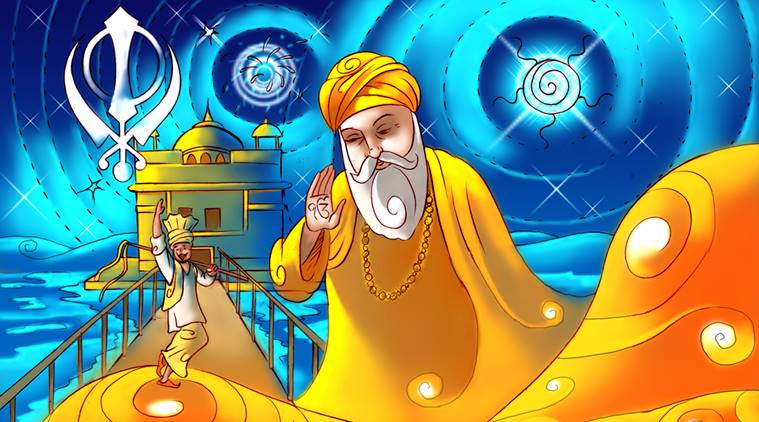- India
- International
Guru Nanak’s teachings hold out hope for us all
India has certainly been blessed with great individuals who left their impact on the Subcontinent, and Guru Nanak Dev was one such person.
 One can say that Guru Nanak was the harbinger of a new era of Indian civilisation.
One can say that Guru Nanak was the harbinger of a new era of Indian civilisation.
The greatness of a person is not measured merely on the basis of the good deeds done in his or her lifetime but by the impact of such deeds over centuries. India has certainly been blessed with great individuals who left their impact on the Subcontinent, and Guru Nanak Dev was one such person.
It has been 550 years since Guru Nanak Dev graced this world. And, with each passing day, the great glory of Guru Nanak keeps expanding, transcending the boundaries of nation, geography, religion, language and culture. Bhai Gurdas, the eminent Sikh scholar, rightly described Guru Nanak’s birth as something like the end of chaos and the beginning of a new dawn, the rise of a new sun. The long night that preceded his birth was gone the instant he came into this world, even as Guru Nanak declared that God is one — formless and without birth and death.
One can say that Guru Nanak was the harbinger of a new era of Indian civilisation. He was a great spiritual leader but his concerns were not confined to matters of religion. He was an enlightened soul who could see what the science of his time could not see. He had a vision for the upliftment of the society. He could see what other people could not even imagine then: He had a vision that there are infinite celestial bodies in a galaxy and millions of skies. Guru Nanak said that the earth rests on the foundation of law or dharma. Remember, in Indian tradition, dharma means law, principle or way of life. It is not a direct translation of the English word, religion. We might say that Guru Nanak was preparing the ground for the Indian renaissance.
Guru Nanak Dev was not an armchair philosopher or a world-renouncing ascetic. He stood for karma as the basis of dharma, and he transformed the idea of spiritualism into the ideology of social responsibility and social change. Earning bread through honest labour and sharing its fruit with the community is the idea behind the lasting legacy of Guru Nanak’s teaching.
Guru Nanak cautioned people to not use religion for earning material benefits. He also led a sustained attack on social inequality arising out of false pride, which in turn comes from caste hierarchy. He created a philosophy of social responsibility, and opposed everything that looked like religion but was actually a trap to exploit the vulnerable. Guru Nanak has explained that reciting god’s name, and unflinching faith in the way god functions is the basis of an ethical life. Guru Nanak was not in search of such notion of truth which had metaphysical, philosophical, logical or other complexities. He valued a simpler notion of truth, a truth that was the basis of honest living. He declared that truth has the highest value in life, but truthful living is higher still in value. In this way, Guru Nanak bridged the gap between the idea and practice of truth.

Guru Nanak also showed how women, who are the embodiment of devotion in Bhakti literature, are central to human life. He even created awareness related to the conservation of water, and the importance of a clean environment. His teachings related to selfless service were very practical and adaptable for the common man: He never preached anything which he did not practice.
Guru Nanak was also a great traveler. He could well be the most travelled saint in the world, who travelled more than 30,000 kilometres. It is difficult to imagine the way he could have managed it with his disciple Mardana, 550 years back. He not only travelled but also had cordial discussions with prominent leaders of different beliefs. He tried to understand their points of view and then put forward his vision of humanity. Shri Guru Granth Sahib gives an idea of a variety of saints he could have met, and their thoughts also find a prominent place in the holy book.
It was a time when India was passing through a crucial phase, and society was undergoing a lot of changes and imbalances in the medieval period. Guru Nanak had the courage to say “Na koi Hindu na Musalman”, and that all are the children of one god.
He emphasised on three things: “Kirat karni”, which means to work hard, and earn good karma and an honest livelihood; “vand chakhna” which means to not be selfish, and share with others; and, “naam japa”, which means to meditate and remember the name of god.
Guru Nanak’s life, teachings and writings are part of the collective legacy of human civilisation. His path of unity, equality, humility and service to mankind is being followed still by a large number of people across the world. The need of the hour is to remember Guru Nanak Devji and follow his teachings for national unity and social harmony.
This article first appeared in the print edition on November 12, 2019 under the title ‘Legacy for a civilisation’. The writer is member-secretary, IGNCA.
EXPRESS OPINION
Apr 25: Latest News
- 01
- 02
- 03
- 04
- 05










































